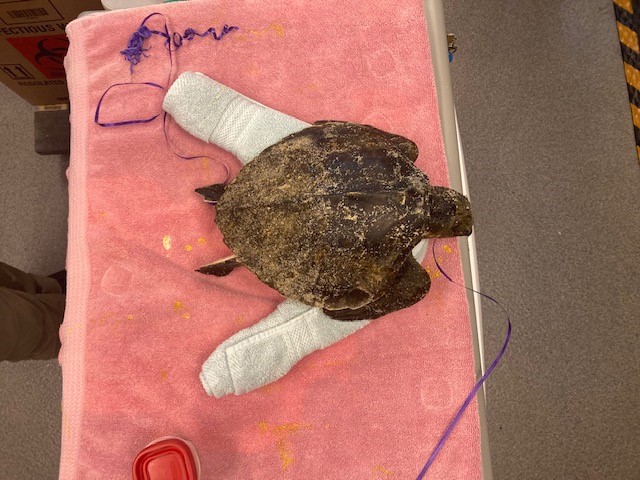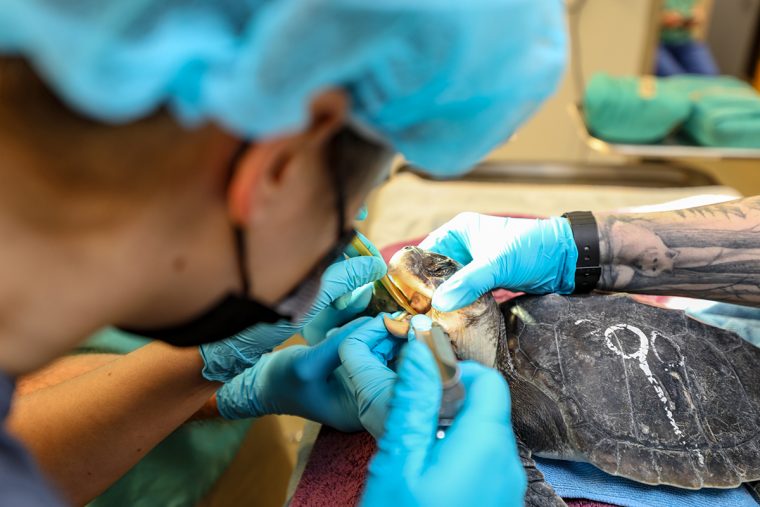Ribbon measured more than seven feet long

BOSTON, MASS. (January 26, 2022) – A sea turtle that was rescued on Cape Cod after ingesting a balloon ribbon is recovering well following surgery at the New England Aquarium, concluding a stranding season during which more than 500 turtles required medical treatment.
**PHOTOS AVAILABLE HERE, WITH CREDIT TO NEW ENGLAND AQUARIUM**
Staff with Mass Audubon’s Wellfleet Bay Wildlife Sanctuary discovered the Kemp’s ridley turtle, a critically endangered species, cold-stunned on Ellis Beach in Brewster, MA, on Nov. 30, 2021. The turtle had ingested a long balloon ribbon that extended from outside its beak, through its digestive tract, and out its cloaca or posterior opening. Part of the balloon was still attached to the end of the ribbon, already having passed through the turtle’s gastrointestinal tract. Bob Prescott, who oversees Wellfleet Bay’s sea turtle rescue program, originally thought the balloon ribbon had washed ashore with the turtle when he found it in tidal debris.
“Once I picked it up, I knew this turtle had big problems besides being cold-stunned,” Prescott said. “Having previously necropsied two Kemp’s ridleys that had ingested balloons with ribbons, things can be very complicated internally. It is a great credit to the Aquarium’s triage and veterinary staff that this turtle survived.”
The turtle was immediately transported to the New England Aquarium’s Sea Turtle Hospital in Quincy, MA, where it underwent a medical exam. The turtle was hypothermic, dehydrated, and anemic upon arrival. Ribbon or string is particularly dangerous for animals because it can cause bunching of the intestine. As the tension of the ribbon increases, it can begin to cut through the intestinal wall, causing severe damage, infection, and even death.
“We knew that this turtle would require surgery to remove the ribbon, but we had to stabilize it for several days before it was strong enough to tolerate general anesthesia,” said Dr. Charles Innis, Director of Animal Health at the New England Aquarium.
Staff treated the turtle with fluids, antibiotics, and nutritional support. On Dec. 8, Aquarium veterinarians Drs. Melissa Joblon and Kathy Tuxbury operated on the turtle, performing an enterotomy (or incision into the intestine) to remove the ribbon, which measured more than seven feet long in total. Fortunately, the intestine had not yet been severely damaged, and the turtle is recovering well following the procedure. The Kemp’s ridley will be released back into the ocean off Cape Cod this summer.
“It was gratifying that we were able to remove the ribbon safely and save this turtle before there was irreversible damage to the gastrointestinal tract,” said Dr. Joblon.

Increasing amounts of plastic continue to make their way into the ocean, which has a serious impact on ocean animals and ecosystems. Research by the University of Queensland estimates that more than half of sea turtles worldwide have ingested plastic or other marine debris. Balloons, whether accidentally or intentionally released, can be particularly problematic.
The successful surgery for this turtle caps off the third-busiest cold-stunning season for the Aquarium and Mass Audubon, with more than 500 live sea turtles stranding on Cape Cod beaches. The season got off to a late start in November due to temperature fluctuations that kept Cape Cod Bay warm and lasted into 2022, with sea turtles continuing to wash ashore the first two weeks of January. More than 85% of triaged turtles have survived. Depending on the severity of their illness, hospitalized turtles can require weeks or months of treatment.
“Our triage system gives turtles requiring specialized care an opportunity to fully recover,” said Adam Kennedy, Manager of Rescue and Rehabilitation at the Aquarium. “As always, our staff, interns, and volunteers have provided a high level of care this season to give these animals a second chance to once again call the ocean home. We are proud to operate one of the largest sea turtle rescue and rehabilitation programs in the world.”
The Aquarium works closely with colleagues at the National Oceanic and Atmospheric Administration’s (NOAA) Fisheries Service to identify rehabilitation centers across the country that can accept stabilized turtles, freeing up space in Massachusetts. The non-profit organization Turtles Fly Too plays a key role in transporting the turtles to these facilities.
MEDIA CONTACT:
Pam Bechtold Snyder – psnyder@neaq.org, 617-686-5068
